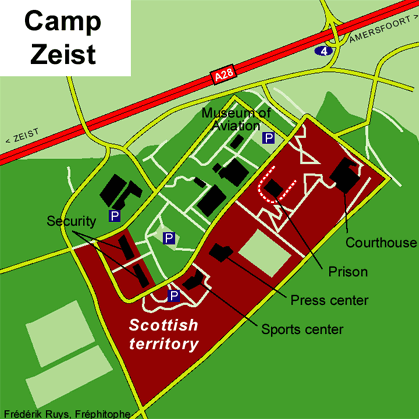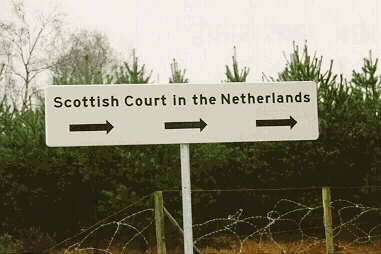Home > Europa > Paesi Bassi > Camp Zeist
Camp Zeist: stranezza territoriale per un processo
Testo: T. Aebischer
L'antefatto storico
Il Boeing 747 della Pan Am 103 in volo da Londra a New York esplose nei cieli di Lockerbie (Scozia) il 21 dicembre 1988 a causa di una bomba. Nell'attentato rimasero uccise tutte e 259 le persone a bordo più 11 a terra. Dopo l'inchiesta ed alcune risoluzioni dell'ONU per costringere la Libia ad estradare i due libici Abdel Basset Al-Megrahi, agente dei servizi segreti, e Al-Amin Khalifa Fahima, essi furono accusati dell'attentato. I due imputati libici si dichiararono, all'inizio del processo, innocenti.Il giudizio si è svolto secondo la legge scozzese in territorio olandese, e scozzesi erano anche i tre giudici della Corte. Il processo più l'appello durarono circa tre anni. Il 31 gennaio 2001 fu emessa la sentenza di primo grado che riconobbe Abdel Basset Al-Megrahi colpevole della strage di Lockerbie e condannato all'ergastolo. L'altro imputato, Al-Amin Khalifa Fahima, fu assolto da tutte le accuse. L'imputato condannato ricorse in appello, ma la condanna fu confermata nel marzo 2002.
Il luogo
La base aerea di Soesterberg, chiamata Camp Zeist (in olandese Kamp van Zeist), si trova al centro dei Paesi Bassi 14 km ad est di Utrecht e presso il campo di battaglia di Austerlitz. Era una vecchia base della NATO con un'estensione di 10 ettari; oggi é la sede del museo olandese dell'aeronautica.Dopo lunghe trattative che hanno coinvolto anche l'ONU si decise di far svolgere il processo in territorio olandese in base alla legge scozzese poiché lo scoppio della bomba avvenne nello spazio aereo della Scozia in base al principio giuridico domus delicti.

Il processo si è tenuto nei Paesi Bassi non in base alle clausole del diritto internazionale, ma a seguito di un accordo.
 Ciò si é reso necessario poiché entrambe le parti, da una parte la Libia e dall'altra Scozia, Stati Uniti e Gran Bretagna, ritenevano un processo svolto nella parte avversa non imparziale.
Ciò si é reso necessario poiché entrambe le parti, da una parte la Libia e dall'altra Scozia, Stati Uniti e Gran Bretagna, ritenevano un processo svolto nella parte avversa non imparziale.Perciò si decise di esperire il dibattimento in un luogo "neutrale".
Il luogo fu scelto per la sua lontananza da centri abitati e per la presenza di alcuni fabbricati che dopo il riadattamento avrebbero ospitato le centinaia di persone coinvolte con il processo.
L'accordo
Con la risoluzione 1192 del 27 agosto 1998, il Consiglio di Sicurezza dell'ONU chiese alla Gran Bretagna ed ai Paesi Bassi di operarsi al più presto per un accordo che facilitasse l'apertura del processo:Recalling its resolutions 731 (1992) of 21 January 1992, 748 (1992) of 31 March 1992 and 883 (1993) of 11 November 1993,
[...]
1. Demands once again that the Libyan Government immediately comply with the above-mentioned resolutions;
2. Welcomes the initiative for the trial of the two persons charged with the bombing of Pan Am flight 103 ("the two accused") before a Scottish court sitting in the Netherlands, as contained in the letter dated 24 August 1998 from the Acting Permanent Representatives of the United Kingdom of Great Britain and Northern Ireland and of the United States of America ("the initiative") and its attachments, and the willingness of the Government of the Netherlands to cooperate in the implementation of the initiative;
3. Calls upon the Government of the Netherlands and the Government of the United Kingdom to take such steps as are necessary to implement the initiative, including the conclusion of arrangements with a view to enabling the court described in paragraph 2 to exercise jurisdiction in the terms of the intended Agreement between the two Governments, attached to the said letter of 24 August 1998;
L'accordo con i Paesi Bassi fu preceduto dall'atto di autorizzazione affinché la Corte scozzese si potesse spostare in quel paese. Tale atto é denominato The High Court of Justiciary (Proceedings in the Netherlands) (United Nations) Order 1998 n. 2251 che all'art. 3 comma 1 stabilisce che
For the purpose of conducting criminal proceedings on indictment against Abdelbaset Ali Mohmed Al Megrahi and Al Amin Khalifa Fhimah (in this Order referred to as "the accused") on the charges of conspiracy to murder, murder and contravention of the Aviation Security Act 1982 specified in the petition upon which warrant for arrest was issued by the Sheriff of South Strathclyde, Dumfries and Galloway on 13th November 1991, the High Court of Justiciary may, in accordance with the provisions of this Order, sit in the Netherlands.
 L'accordo tra Gran Bretagna e Paesi Bassi per il trasferimento della Corte di giustizia scozzese nei Paesi Bassi fu siglato il 18 settembre 1998 tra il ministro degli Esteri olandese Jozias van Aartsen e l'ambasciatrice britannica a Le Hague Rosemary Spencer. Ciò a fronte dell'accettazione della Libia comunicata il mese precedente. L'accordo fu ratificato il 14 novembre 1998.
L'accordo tra Gran Bretagna e Paesi Bassi per il trasferimento della Corte di giustizia scozzese nei Paesi Bassi fu siglato il 18 settembre 1998 tra il ministro degli Esteri olandese Jozias van Aartsen e l'ambasciatrice britannica a Le Hague Rosemary Spencer. Ciò a fronte dell'accettazione della Libia comunicata il mese precedente. L'accordo fu ratificato il 14 novembre 1998.L'accordo avrebbe concesso piena giurisdizione scozzese su Camp Zeist come se fosse un'ambasciata (extraterritorialità). Qualcuno ha ipotizzato che il campo fosse diventato un’exclave scozzese in territorio olandese ciò che non risulta come si evince dalle ultime parole dell’Ordine 1998 n. 2251 che affermano che la Corte scozzese si sarebbe riunita nei Paesi Bassi. Se il campo fosse stato territorio o considerato tale, l’autorizzazione per lo spostamento non sarebbe stata necessaria.
Il testo dell’accordo nelle parti a noi utili per l'argomento che trattiamo sono le seguenti:
DRAFT AGREEMENT BETWEEN THE GOVERNMENT OF THE KINGDOM OF THE NETHERLANDS AND THE GOVENNMENT OF THE UNITED KINGDOM OF GREAT BRITAIN AND NORTHERN IRELAND CONCERNING A SCOTTISH TRIAL IN THE NETHERLANDS
The Government of the Kingdom of the Netherlands and the Government of the United Kingdom of Great Britain and Northern Ireland;
Recalling that on 21 December 1988 Pan American World Airways flight 1C3 was bombed over Lockerbie in Scotland and 270 persons died;
Recalling that on 13 November 1991, following the presentation of a petition by the Procurator Fiscal for Dumfries, the Sheriff of South Strathclyde, Dumfries and Galloway in Scotland granted a warrant for the arrest of Abdelbaset Ali Niolirned Al Megrahi and Al Amiri Khalia Fhimah ("the accused") on charges of conspiracy to murder, murder and contravention of the Aviation Security Act 1982 of the United Kingdom of Great Britain and Northern Ireland;
Recalling that the Security Council of the United Nations, acting under Chapter VII of the United Nations Charter, in its Resolutions 748 (1992) and 883 (1993), demanded inter alia that Libya ensure the appearance of the accused for trial before a Scottish court;
Noting the letter of ………… 1998 from the Permanent Representatives of the United Kingdom of Great Britain and Northern Ireland and of the United States of America to the Secretary-General of the United Nations proposing in it the accused be tried before a Scottish Court sitting in the Kingdom of the Netherlands in accordance with the arrangements set out in that letter (Annex 1),
Having due regard to the decisions of the Security Council, acting under Chapter
VII of the Charter of the United Nations, in its Resolution (1998) (Annex 2); the Government of the Kingdom of the Netherlands and the Government of the United Kingdom of Great Britain and Northern Ireland wish to conclude an Agreement regulating the sitting of the Scottish Court in the Netherlands and all matters necessary for the proper functioning in the Netherlands of that Scottish Court for the purpose of the trial of the accused;
Have agreed as follows:
[...]
Article 2
Purpose and Scope of the Agreement
This Agreement regulates the sitting of the Scottish Court in the Netherlands and the matters arising out of the trial and the proper functioning of the Scottish Court.
Article 3
The Scottish Court
[...]
(2) The jurisdiction of the Scottish Court is limited to the trial
[...]
4) The trial will be deemed to be ended when any of the following events, but not necessarily the same event, has occurred in relation to both accused:
(a) the accused is acquitted;
(b) the trial is discontinued by process of law preventing any further trial under Scots Law; or
(c) any judgements of the Scottish Court following conviction have become final and conclusive.
[...]
Article 13
Emblem, Markings and Flag
The Scottish Court shall be entitled to display its emblem and markings, as well as the appropriate flag, on its premises.
[...]
Article 29
Final Provisions
(1) This Agreement shall enter into force on a date to be agreed by the Parties, provided that they may agree in the meantime to apply provisionally any of its provisions.
(2) Subject to paragraph (3), this Agreement shall remain in force for one year from its entry into force, with the possibility of extending it by mutual agreement.
(3) This Agreement shall terminate
(a) on the day after the date of the end of the trial (as defined in Article3(4)), and any person then detained or imprisoned in accordance with Article 3(3)(c) or (d) shall be released on that day, or
(b) seven days after the date on which the Parties, after consultations with the Secretary-General of the United Nations, agree in an exchange of notes that there is no reasonable prospect of the trial taking place before the Scottish Court in the Netherlands as envisaged in this Agreement.
(4) Termination following completion of the trial shall not affect:
(a) those provisions of this Agreement which are required for the orderly termination of the operation of the Scottish Court, inducing the transfer of the accused in accordance with Article 16(2)(b); and
(b) the continuation of the immunity from legal process in respect of words spoken or written or acts done in the capacity as solicitor or advocate of the accused.
(5) This Agreement may be amended by mutual consent at any time at the request of either Party
With respect to the Kingdom of the Netherlands this Agreement shall apply to the part of the Kingdom in Europe only.
Anche nell’accordo, all’art. 2, si evidenzia lo spostamento su territorio olandese. Ed all’art. 3 si definisce l’ambito della giurisdizione scozzese: il processo.
All'indomani dell'inizio del processo Camp Zeist fu al di fuori della giurisdizione delle autorità olandesi, mentre quest'ultime avrebbero garantito la sicurezza esterna. Al termine del processo di appello il territorio ritornò sotto la piena giurisdizione olandese.

